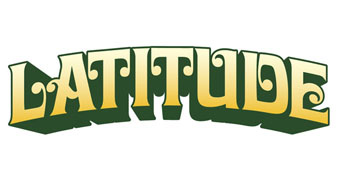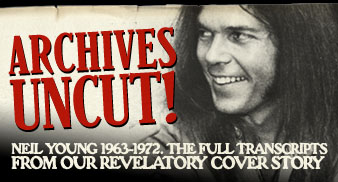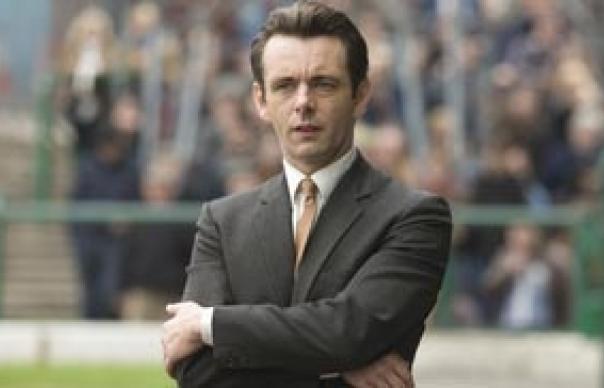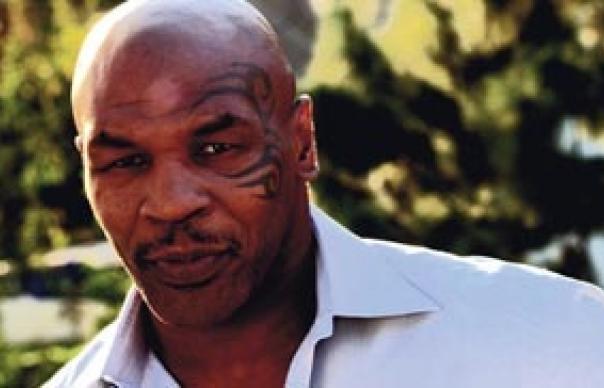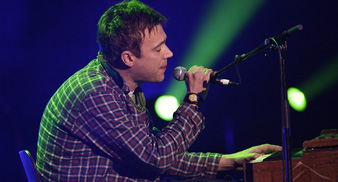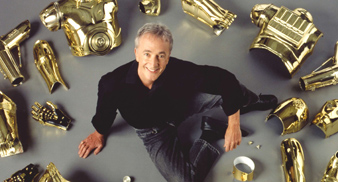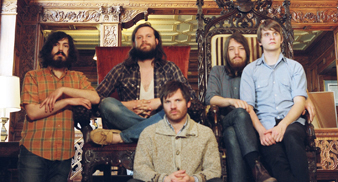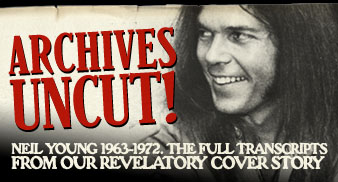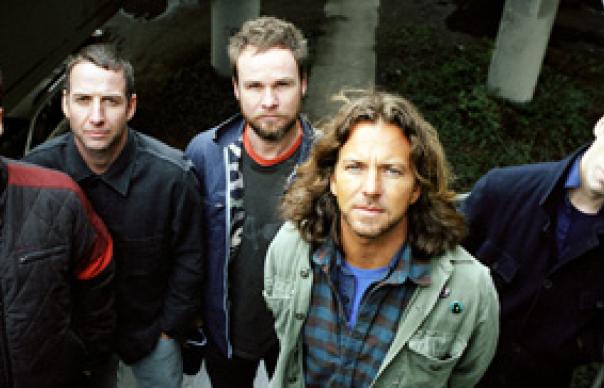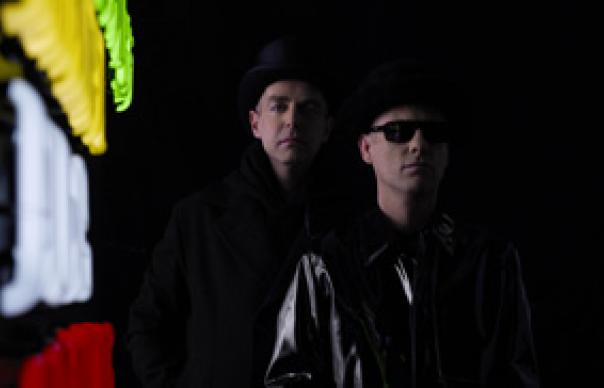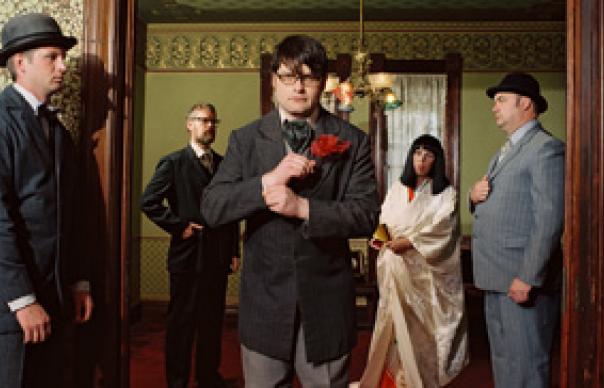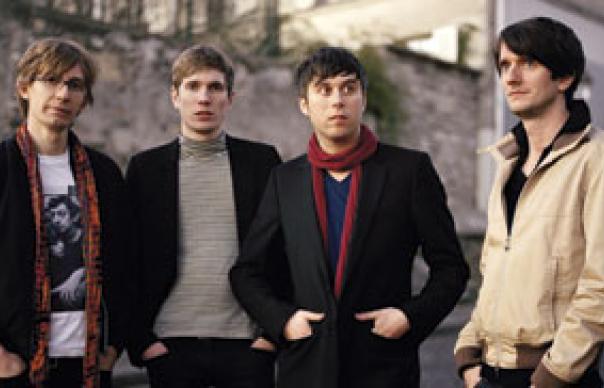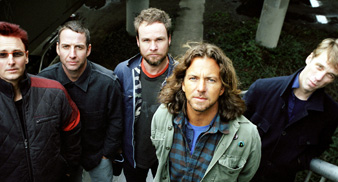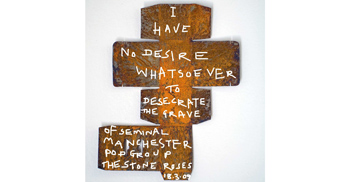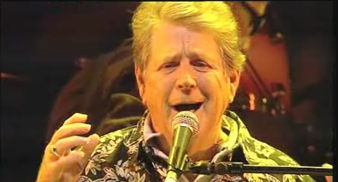The first headliners and ticket details revealed
 This year's Latitude 2009 is being launched today (March 23), with the first headliners for the event's fourth year being announced at 7pm.
This year's Latitude 2009 is being launched today (March 23), with the first headliners for the event's fourth year being announced at 7pm.
 Franz Ferdinand, Sigur Ros, Interpol headlined the Obelisk main stage at the three-day Suffolk festival last Summer, whilst Blondie, Martha Wainwright and the House of Love all played at the Uncut Arena.
Grinderman, Elbow and Joanna Newsom were also some of our highlights last year.
Franz Ferdinand, Sigur Ros, Interpol headlined the Obelisk main stage at the three-day Suffolk festival last Summer, whilst Blondie, Martha Wainwright and the House of Love all played at the Uncut Arena.
Grinderman, Elbow and Joanna Newsom were also some of our highlights last year.
 Uncut will once again be hosting the second stage, all details will be revealed this evening at 7pm, so check back to www.uncut.co.uk then!
Latitude 2009 takes place at Henham Park in Southwold, Suffolk from July 16 - 19.
Tickets go onsale at 7pm and Uncut will have a exclusive ticket link.
More information about Latitude Festival and previous line-ups can be found here: latitudefestival.co.uk
For more music and film news click here
Uncut will once again be hosting the second stage, all details will be revealed this evening at 7pm, so check back to www.uncut.co.uk then!
Latitude 2009 takes place at Henham Park in Southwold, Suffolk from July 16 - 19.
Tickets go onsale at 7pm and Uncut will have a exclusive ticket link.
More information about Latitude Festival and previous line-ups can be found here: latitudefestival.co.uk
For more music and film news click here
Latitude Festival 2009 launches today!
Latitude Festival Announcement Today!
This year's Latitude 2009 is being launched today (March 23), with the first headliners for the event's fourth year being announced by Festival Republic's managing director Melvin Benn at 7pm. Franz Ferdinand, Sigur Ros, Interpol headlined the Obelisk main stage at the three-day Suffolk festival last Summer, whilst Blondie, Martha Wainwright and the House of Love all played at the Uncut Arena. Grinderman, Elbow and Joanna Newsom were also some of our highlights last year. Uncut will once again be hosting the second stage, all details will be revealed this evening at 7pm, so check back to www.uncut.co.uk then! Latitude 2009 will take place at Henham Park in Southwold, Suffolk from July 16 - 19. Tickets go onsale at 7pm and Uncut will have a exclusive ticket link. More information about Latitude Festival and previous line-ups can be found here: latitudefestival.co.uk For more music and film news click here
This year’s Latitude 2009 is being launched today (March 23), with the first headliners for the event’s fourth year being announced by Festival Republic’s managing director Melvin Benn at 7pm.
Franz Ferdinand, Sigur Ros, Interpol headlined the Obelisk main stage at the three-day Suffolk festival last Summer, whilst Blondie, Martha Wainwright and the House of Love all played at the Uncut Arena.
Grinderman, Elbow and Joanna Newsom were also some of our highlights last year.
Uncut will once again be hosting the second stage, all details will be revealed this evening at 7pm, so check back to www.uncut.co.uk then!
Latitude 2009 will take place at Henham Park in Southwold, Suffolk from July 16 – 19.
Tickets go onsale at 7pm and Uncut will have a exclusive ticket link.
More information about Latitude Festival and previous line-ups can be found here: latitudefestival.co.uk
For more music and film news click here
Jarvis Cocker: “Further Complications”
A quick caveat first. I only have seven tracks of this new Jarvis Cocker album, “Further Complications”. According to the lengthy note from Jarvis which accompanies them, the other eight aren’t “in a fit state to be listened to at the present time.” I suspect this must have changed now, since I’ve been sat on this sampler a while: it’s taken a surprising amount of time to bed in. Not sure why this is, really. In spite of not being that impressed with most of his first solo album, I always felt like Cocker would make an excellent solo artist, and naturally expected this one to be good. And it turns out, it is – or at least the sampler is. Perhaps the frustration is that it doesn’t, on this snippet, sound like the really great solo record that I’m sure he’ll make one day. Rather, “Further Complications” feels like a tentative step towards what may be dangerously termed Jarvis Cocker’s “mature” style: a realisation that perhaps his peers aren’t other Britpop survivors/recovering casualties, but wry, super-literate men of a certain age like Nick Cave and Lou Reed. He has, though, gone a weird way of getting there, since “Further Complications” was recorded by Steve Albini, a doubtless amused engineer of choice amongst the post-Britpop diaspora, it seems, since he’s also done the honours on the new Manic Street Preachers album, “Journal For Plague Lovers” (a record cursed, of course, by the involvement of the Manic Street Preachers). Albini is a terrific man to have at the controls, and the simple precision of his recording technique is a joy to hear (never better than on The Breeders’ “Title TK”, I’d say; there’s an undervalued record). It is, though, an odd fit with Jarvis, whose musical settings have never appeared to be about rawness or instrumental authenticity. Here, “Angela” is a glam opener, but it’s an austere, menacing, fuzzy kind of glam, as if The Glitter Band had recorded “Angel Eyes” for the Amphetamine Reptile label. There’s a notionally crude immediacy to a song like this, but it actually takes a while to make sense – likewise a grunting instrumental called “Pilchard”. By “I Told You Twice (Leftovers)”, we’re on more familiar territory, with a deadly opening line of, “I met her in the Museum of Paleontology and I make no bones about it.” The treatment, though, is like something off “New York”, perhaps, or maybe late ‘90s/early 21st Century Bad Seeds (the excellent “Hold Still” even more so). In his notes, Cocker suggests that he hasn’t “gone rock”, but has “discovered that, with this band, he COULD rock and so he’d be a fool not to (when the situation demanded it).” It can be risky heading into this sort of territory when popular opinion deems you to be, one way or another, a crooner. I was listening to the reissue of Morrissey’s “Southpaw Grammar” the other day, marvelling at all the turgid rock-outs that are not materially any worse than the ones that clutter up the last three alleged return-to-forms. Then “The Teachers Are Afraid Of The Pupils” came out, that endless looming orchestral vamp, and it was blindingly obviously a setting that suited Morrissey so much better. Cocker’s a much more flexible and intelligent performer than Morrissey, I’d say, and he can work his way around genre and sound with far greater ease; he’s probably wary of the crooning option, not least because his friend Richard Hawley has cornered that market so skilfully. But these are good songs that feel in some way transitional: a sort of dignified retreat from kitsch, a project of making reflective glam rock when you have a grey beard. Then, at the end of the sampler, Cocker throws in a mirrored curveball. “You’re In My Eyes (Discosong)” is a measured, elegaic retake on his Pulp-era dancefloor songs: still quite organic sounding, but with a few little touches of French house and so on buried in the mix. Most interestingly, there’s a new dimension and depth to his voice, that sounds softer and fuller where once it would’ve become shrill and frantic. Very promising, as is the info about the tracks still to come. “Homewrecker”, an “absolute racket featuring saxophone from Steve Mackay”, anyone?
A quick caveat first. I only have seven tracks of this new Jarvis Cocker album, “Further Complications”. According to the lengthy note from Jarvis which accompanies them, the other eight aren’t “in a fit state to be listened to at the present time.”
Part 15: Billy Talbot
BILLY TALBOT
Crazy Horse bassist and founder, and member of that band’s previous incarnation
***
UNCUT: Can you tell me your first impressions of Neil? Did you first meet when he was recording the first Buffalo Springfield album?
TALBOT: I liked him right away. We were young men and we had much in common. He seemed interesting and I liked his songs.
What do you recall of him coming over to your house to do a version of “Mr Soul”, with you and Danny Whitten?
I remember how the song felt and how I felt hearing it. It was slower than the version that Buffalo Springfield went on to do. I liked the way it felt acoustically, but I came to appreciate the Buffalo Springfield version as well.
Was Neil a regular at Rockets HQ on Laurel Canyon Boulevard? What kind of stuff did you get up to?
He came by a couple of times. I believe the last time he was there, the police also showed, so that kind of quelled the scene at Rockets Headquarters, as you call it.
Neil once admitted he “probably did steal” you, Danny and Ralph from The Rockets for Crazy Horse. Was it something you gladly entered into?
We just moved into being Crazy Horse quite naturally. We never thought of it being the end of the Rockets. We were naive, because, of course, it was The Rockets, where we spent hours and hours jamming on two chords, or sometimes three, or even just one chord, with
Danny and George and Leon churning out rhythm and melodies on the guitars, Ralph and I taking care of the drums and bass and Bobby soaring on the violin. You can hear a little touch of how great Bobby Notkoff is on “Running Dry” from Everybody Knows This Is Nowhere.
What do you remember of Neil sitting in with The Rockets at The Whisky A Go-Go in August ’68? Did you see the potential of Neil and yourselves together?
I remember Bobby sitting out and watching us from the audience, and Neil’s guitar sound being big. I remember it was a lot of fun.
Was Neil particularly drawn to Danny? Was there a common bond between them?
Well, yeah, naturally. Danny was a singer, songwriter and played guitar. So did Neil. And both had deep feelings and intelligence. They were both very passionate people.
Can you tell me about working up “Cowgirl In The Sand” and “Down By the River” at one of your earliest sessions at Neil’s studio? And is it true that “Down By The River” was inspired/based on Danny’s “Let Me Go”?
We worked up “Down By The River” first, as I remember. I don’t know if you would call it the Crazy Horse beat, as much as a ‘feel’. Ralph and I and Danny were used to jamming on two chords, and Neil just soared away. I think we went out on the road and then recorded
“Cowgirl In The Sand” when we came back – another two-chord jam song. As far as Neil being influenced by “Let Me Go”, I have no idea. In the song, Danny does sing about going down to the river and it does have a nice long jam in it, but other than that, I don’t know if
anyone could really say. You could wonder what Danny’s influences were when he wrote “Let Me Go”. For all of you who don’t know, “Let Me Go” is on The Rockets’ one and only album.
Can you describe the unique chemistry of Neil and Crazy Horse? Neil has talked of being especially keen on “the groove” and the abandon with which you all played.
We were just trying to be real with the feel.
David Briggs was apparently astonished at the energy and intensity of “Running Dry” when he first heard it. Can you give me your own memories of recording that song?
My memory is of Bobby Notkoff playing the violin, and Danny and Neil singing the choruses.
What do you recall of playing some shows at The Bitter End with Neil in February 1969? Neil would do a solo set first, then be joined by Crazy Horse
That was part of a tour, and was, I think, right in between us recording “Down By The River” and “Cowgirl In The Sand”. I remember that the people liked us.
Another specific gig: I believe you once played a Mafia joint in Rhode Island, where a fight broke out, the place emptied and you carried on playing. Did that really happen like that?
Yes, it did. I don’t know if it was a Mafia place, but it was in Rhode Island, and a fight did break out. Nobody bothered us and we just kept playing “Cowgirl In the Sand”. When they came back in, we were still playing.
Is true that, around 1970, Neil preferred to record during a full moon? Would you organise recording sessions around this apsect?
Yes it’s true, still is true, and it’s true for me too.
Were drugs ever an issue with Neil and Crazy Horse? For instance, Crosby, Stills & Nash used to have a ritual where they’d smoke a joint before going on stage.
We have our rituals as well.
Can you describe the studio recordings of various After The Goldrush tracks? What was the dynamic like in the studio? And what kind of instructions, if any, did Neil give?
I don’t remember any instructions as such. I think we were working together pretty much, coming up with our own answers. Of course, Neil was leading the way. Jack Nitzsche was playing piano on “When You Dance You Can Really Love” and we recorded that one up at Neil’s house. “I Believe In You” and “Oh, Lonesome Me” were done in the studio. I don’t remember which one, perhaps Wally Heider’s in LA or San Francisco.
Was “When You Dance…” the last song you all played on with Danny?
Yes. We did vocal harmonies for other songs on After The Goldrush with him after that. Also, there were sessions with Danny without Neil, recording some of Danny’s songs which were never released. The master tapes for those sessions are missing. There are some heavy generation-loss cassette tapes around. The song titles are “Share” and “Oh Boy”, among others.
Can you tell me what you remember of the song “Wonderin'”, which is likely to turn up on Archives? Do you recall recording it, or Neil first playing it to you?
Yeah, we played it on Live At The Fillmore East. Check it out. I like the way we played it back then.
Can you tell me about those two nights at the Fillmore East in 1970? Did you feel a particular vibe?
I distinctly remember being greatly excited to be playing there. Jack [Nitzsche] was playing with us. Previously we’d been touring with the four of us: Neil, Ralph, Danny, and me. Unfortunately, none of those earlier shows was ever recorded as far as I know, such as the one in Rhode Island that you referred to or several shows that we played in Cleveland at a club known as Le Cave.
What do you think are Neil’s unique qualities? What really sets him apart?
It’s a mixture of talent, intelligence, soul and hard work. He could be the definition of an artist.
Do you have a favourite Neil story? Perhaps something that throws light on a particular aspect of his character?
Yeah, I’ve got a bunch. We’ve known each other for a lot of years now – most of our lives. We trust each other and you don’t mess around with that.
INTERVIEW: ROB HUGHES
The Damned United
THE DAMNED UNITED
Directed by Tom Hooper
Starring Michael Sheen, Colm Meaney, Timothy Spall, Jim Broadbent
***
Arguably the most charismatic football manager ever, Brian Clough led small clubs to unprecedented success in the Seventies. Peter Morgan’s script, based on David Peace’s book, focuses however on his disastrous 44-day reign at Leeds United. Clough replaced his despised rival Don Revie, and instantly alienated the team, telling them they were violent cheats. That he was right won him no love, and soon the bully boys had the idiosyncratic genius (“I believe in fairies”) sacked. It’s rich with flawed egos, hubris and power plays.
Hooper’s film rattles along crisply, with the director mixing punchy tussles on and off the field. Clough’s personality offers rich humour, and if Spall is miscast as his lieutenant, Peter Taylor, the rapport between the pair makes a tragicomic love story. There’s a nocturnal facing-the-abyss centre-piece which is almost identical to that in Frost/Nixon. Sheen is mostly great, though fleetingly he veers towards a camp Alan Partridge. If he’s to avoid being this era’s Mike Yarwood, this must be his last act of nasal-based mimicry.
CHRIS ROBERTS
Tyson
TYSON
Directed by James Toback
Starring Mike Tyson
***
Few sportsmen are verbally articulate, so it’s startling to see the former heavyweight world champ, disgraced and near-broken, self-analysing with an awareness of “dread, nothingness and chaos of the brain”. Alongside visceral footage, Mike Tyson narrates “a Greek tragedy. The only problem is that I’m the subject”.
He rose from a dire background to become the most famous, fearsome boxer since Ali. But his own fear, he stresses, drove his brutality. He cries, recalling that “nobody would ever fuck with me again” – long pause – “because I would kill them.” Hubris ruins him. He admits being a “pig” with women, but vehemently denies the “heinous” rape charge that saw him jailed for three years. He comes back, losing bouts as he loses focus. He bites Holyfield’s ear; pleads retaliation. He muses, “I don’t got the fighting guts any more. I’m not an animal.” Now, “The past is history. The future is mystery.”
James Toback’s been close with Tyson since the 80s (he played in Toback’s Black And White), and this stab at redemption is subjective and sympathetic.
CHRIS ROBERTS
Flower-Corsano Duo: “The Four Aims”
In my ignorance, the last time I blogged about the Flower-Corsano Duo, I wrote some stuff about Mick Flower’s instrument, the shahi baaja, and described it, as per the press-release, as a "Japanese electric dulcimer/autoharp". Grappling with the marvel that is the duo’s second (I think, anyway) CD, “The Four Aims”, I’ve been doing a little unreliable research to try and work out whether the Japan Banjo which Flower plays here is the same as a shahi baaja, and I think they may be pretty similar. Here’s what Wiki says about the shahi baaja, which suggests it’s an Indian instrument, an electric dulcimer, inspired by a Japanese one. And here’s a “Japanese banjo” - an Indian instrument from the first half of the 20th Century. If nothing else, they make a similarly intense racket, if “The Four Aims” and its predecessor, “The Radiant Mirror” are anything to go by. Flower is part of one of the British music scene’s secret cache of great bands, the improv-drone ensemble Vibracathedral Orchestra. Chris Corsano is a free drummer seen in all kinds of set-ups, most recently alongside Bjork, of all people. This set begins more or less where “The Radiant Mirror” left off, with “I, Brute Force?”, an immense, expressive noise jam that sounds very roughly like an avant-punk response to Hendrix’s take on “The Star-Spangled Banner”. I have no idea what Flower is doing, whether he’s playing with precise virtuosity or just cranking up the machine to spit random fire, but it sounds amazing. Last time out, they more or less kept this up for the duration. But “The Four Aims” is more varied, and so “The Three Degrees Of Temptation” privileges Corsano’s hyperactive percussive scuffle. Then, the final three tracks form a sort of raga suite where the Indian origins of Flower’s instrument become most apparent: during the outstanding “The Beginning Of The End”, especially, I’m reminded of some Ravi Shankar I’ve been listening to recently (a reminder, maybe, of how reference points change with your own listening habits more than the actual creative evolution of musicians). By the end, though, and “The Main Ingredient”, the firestorm is back, and Flower is channelling Sonny Sharrock again. There’s some other stuff on the Flower/Corsano Myspace. Not sure how often they update, because Tom’s one of their three friends, but check it out.
In my ignorance, the last time I blogged about the Flower-Corsano Duo, I wrote some stuff about Mick Flower’s instrument, the shahi baaja, and described it, as per the press-release, as a “Japanese electric dulcimer/autoharp”.
Star Wars’ C-3PO Returns To London For The Stage Show
Star Wars' actor Anthony Daniels has joined the cast of Star Wars™: A Musical Journey, which opens in London next month. Originally the voice of droid C-3PO in all six of the Star Wars films, Anthony Daniels will take on the role of the voice-over narrator for the new show which features Oscar winning original scores by John Williams perfromed by 86 members of the Royal Royal Philharmonic Orchestra. Daniels comments on coming to London, saying: “I’m so excited to be asked to tell the story to such a huge audience. Years ago C-3PO conducted the London Symphony Orchestra in the Albert Hall. Most exciting night of his life… mine too. Now it’s my turn to stand on Europe’s greatest new stage at the O2 Arena. I’m not wearing gold this time, but 3PO will be with me in spirit.” The two-hour live multi-media performance also includes an exhibition of memorabilia from all six films, including original models, props, costumes and production artwork. STAR WARS: A Musical Journey takes place at the O2 on April 10 and 11. More details from: www.theo2.co.uk or by calling 0844 856 0202. For more music and film news click here
Star Wars’ actor Anthony Daniels has joined the cast of Star Wars™: A Musical Journey, which opens in London next month.
Originally the voice of droid C-3PO in all six of the Star Wars films, Anthony Daniels will take on the role of the voice-over narrator for the new show which features Oscar winning original scores by John Williams perfromed by 86 members of the Royal Royal Philharmonic Orchestra.
Daniels comments on coming to London, saying: “I’m so excited to be asked to tell the story to such a huge audience. Years ago C-3PO conducted the London Symphony Orchestra in the Albert Hall. Most exciting night of his life… mine too. Now it’s my turn to stand on Europe’s greatest new stage at the O2 Arena. I’m not wearing gold this time, but 3PO will be with me in spirit.”
The two-hour live multi-media performance also includes an exhibition of memorabilia from all six films, including original models, props, costumes and production artwork.
STAR WARS: A Musical Journey takes place at the O2 on April 10 and 11.
More details from: www.theo2.co.uk or by calling 0844 856 0202.
For more music and film news click here
Franz Ferdinand Added To Norwegian Festival
Franz Ferdinand are to headline Norway’s Hove festival on June 22.
The Scottish art-rockers are the third and final headline act to be confirmed after The Killers and Slipknot were revealed last month.
The Hove festival is now in it’s third year is run by Festival Republic, the organisers behind Latitude, Glastonbury, and Reading and Leeds festivals in the UK.
More info and tickets are available here: www.hovefestival.com
For more music and film news click here
Fleet Foxes Announce Five New UK Live Shows
Fleet Foxes have confirmed an extra five live dates to take place around the UK this June and September.
Worked around their appearances at Glastonbury, Hard Rock Calling and the End of the Road festival in Dorset, FF will now also play headline shows in Wolverhampton, Leeds, Glasgow, Newcastle and Manchester.
Fleet Foxes 2009 UK live dates are now as follows:
Wolverhampton, Civic Hall (June 25)
Glastonbury Festival (26)
London, Hyde Park, Hard Rock Calling (27)
Leeds, Academy (June 28)
Glasgow, Academy (September 8)
Newcastle, Academy (9)
Manchester, Apollo (11)
Larmer Tree Gardens, Dorset, End of The Road Festival (12)
Isle of Wight, Bestival (13)
For more music and film news click here
Part 14: CSNY’s Graham Nash
GRAHAM NASH
The silver-tonsilled Blackpool native who left The Hollies to join CSN, later CSNY.
***
UNCUT: When did you first meet Neil?
NASH: I met him in New York City in Bleeker Street, in the Village. That would have been early 1969. We had done the first CSN record. It had been out and obviously it had been very successful. And then we realised that we would have to go out on the road, and Stephen [Stills] wanted to play with somebody else in the band. David [Crosby] and I are decent enough rhythm guitar players, but we’re not lead guitar players like Stephen was. And he had had a history, in Buffalo Springfield, of playing lead guitar parts off Neil. And so it was decided to ask Neil to join. But I wouldn’t entertain the idea before I met him. I wanted to know who he was. Obviously I knew who he was, as an artist – obviously he was Neil Young, even then – and I’d heard “Expecting To Fly” from the Buffalo Springfield, and I thought it was absolutely fantastic. I was very much a fan of Buffalo Springfield, I thought they were fantastic. So I said, let me go to breakfast with Neil and I’ll make the decision after breakfast. And, of course, after we’d finished breakfast, I’d have made him prime minister of Canada! He was very funny, very droll, very dry sense of humour and I liked him immediately.
How did you find Neil worked in the studio? Did he come in with fully-formed ideas, or was he open to input and suggestions from other people?
On the Déjà vu album, Neil’s music was made on Neil’s ranch down just south of San Francisco. He would make the tracks, he would bring them and we would sing our parts on it and then he’d take the parts back home and mix them. So it was kind of a separatist deal – and I think some of us were a bit annoyed about that at the time– but it worked. And what works is always the best thing to go with.
Can you describe was his relationship with Stills was like?
Again, in the studio, there was a special understanding when they played lead together. They always played off each other, sparked ideas. But, with us, Stephen concentrated more on vocals.
What do you remember of the “Helpless” sessions? This is more like a Neil solo song than CSNY.
Yes, it was. Neil kept waiting for us to slow down so he could sing it in the tempo that he wanted. Then some time about two, two-thirty in the morning we’d slowed down enough to catch up with Neil’s coma-paced speed, and then we cut Helpless. It is a tremendously slow song, and it has to be played together, as a unit, otherwise it just doesn’t hang together. But I think it’s a beautiful track.
The Déjà Vu sessions seemed pretty traumatic…
Yes, they ran the gamut of emotions, from thrilling to soul-destroying
You, Stills and Crosby had all split, or lost, partners.
Yeah, David’s girlfriend had been killed, I wasn’t with Joni, Stephen had split with Judy Collins. It was a sad time. But we did have some good music to make.
How did Neil respond to this?
Same way Neil always does, he gets on with the job in hand. He gets on with what we’re supposed to be doing. He’s a tremendously focused man. I appreciate that in him.
You once told UNCUT the Déjà vu sessions were “insanity” particularly the story of Neil¹s bush babies, Harriet and Speedy. What else do you remember about Neil from that period?
It was all crazy. We were staying by the Caravan Lodge Motel, just by the studio there at Wally Hyders (?) in San Francisco, and we all had our own rooms, and it was just fucking madness. You’d go and knock on Neil’s door and this thing would just jump across the room and you’d go, what the hell was that? And he’d say, “Oh man, these are my two bush babies, Harriet and Speedy. I was a bit lonely so I got two friends.” Drugs? Of course, are you kidding? There were so many drugs around that time it was insane. We thought it was creative then, but I haven’t snorted cocaine since 1984, not for about 25 years. At the time we thought it was good, but we were wrong. Cocaine never helps creativity. Marijuana is a much more creative drug than cocaine. But around those sessions I think we were on everything.
What did you think about his early run of solo albums?
Fantastic. I love his stuff. His work rate is prodigious but more importantly his strike rate was even better. There aren’t many duff tracks on any of his albums.
Has Neil changed over the years?
Well, how have we all changed? Let’s start with me, David and Stephen. We started out when we found that we had a certain sound and we made a couple of really fine records. And then you start to get comfortable with stardom and money and fame, etc, and then you come back to being normal. And that’s what I’ve always tried to do. You have to try and remain normal. Neil is very good at that. I think that’s what informs his workrate and his focus – he’s never let stardom get to him at all.
INTERVIEW: JOHN LEWIS
Pearl Jam – Ten: Deluxe Edition (R1991)
Pearl Jam hove hairily into general view in ’91, accompanied by a chorus of disapproval from the grunge mujahedin that turned into a disconsolate wail a year later, a dismal ululation, loud enough to be heard from Seattle to Stockholm, when sales of their debut LP, Ten, went through what is popularly acknowledged as the roof.
What so exercised these flannel-shirted fundamentalists was a perception of Pearl Jam as slick opportunists, mercenary chancers whose music and the way they played it was a cynical betrayal of what grunge was meant to be, a grubby defilement of something they liked to think was wholly pure, unadulterated by gross commercial imperatives.
The idea of Pearl Jam as greedy interlopers, new and unwelcome on the Seattle scene, was blatantly unfair. While vocalist Eddie Vedder had been recruited from San Diego band Bad Radio, founder members Stone Gossard and Jeff Ament were Seattle thoroughbreds and had played in proto-grunge types Green River with Mark Arm and Steve Turner, who later formed Mudhoney.
Gossard and Ament subsequently joined charismatic vocalist Andrew Wood in Mother Love Bone, who were signed to Mercury in a major label deal that was much frowned upon by fledgling grungenistas, for whom noble penury was presumably preferable to the apparent vulgarity of actually selling records. Not that Stone and Jeff actually saw much reward from Mother Love Bone. Andrew Wood, who had a history of drug abuse, died of a heroin overdose four months before the July 1990 release of their debut album, Apple, thus scuppering things entirely for the band.
Kurt Cobain was also famously quick to denounce Pearl Jam, who he seems to have regarded as something akin to the Great Satan, musical evil incarnate (if only Eddie had been as keen to mention The Vaselines as an influence as he was to talk in interviews about his beloved Who!). For Cobain, Ten, released a month before Nirvana’s Nevermind, was a creaking repository of hoary rock clichés, dated metal riffs and hard rock bluster – all those guitar solos, man – that he continued to rail against long after most sensible people had stopped listening to his sulky bleating.
Not that any of this rank snottiness about Pearl Jam’s grunge pedigree carried much weight with the band’s new fans – 12 million of them, eventually – who bought Ten in sufficient numbers to keep it on the US charts for over two years. They only had ears for the music, which was thrilling, and Eddie’s lyrics, which gave heartfelt voice to their adolescent traumas and teenage anxieties, their disen-franchisement, frustrations and the feeling that the world in its entirety was against them.
Pearl Jam were on their way to becoming arguably the biggest US rock band of the ’90s. When I interviewed them in 1993, just after their second album, Vs, came out, it was clear, however, that the group themselves had longstanding misgivings about the final version of Ten and that the comparative rawness and essentially ‘live’ feel of Vs more happily represented them and the way they would have preferred to sound on their debut. There were hints even then that given the opportunity, they’d remix it, to make it sound more like the record they had originally wanted to make.
That opportunity is now here. As part of an elaborate build-up to the band’s 20th anniversary in 2011, Ten is being reissued in four special editions. The Legacy Edition is a two-disc set featuring the original album, digitally remastered, and a completely new mix by Brendan O’Brien, plus six bonus tracks, including out-takes from the Ten sessions and “Just A Girl”, from 1990, one of the first tracks Vedder recorded with the band, who were then still called Mookie Blaylock.
The Deluxe Edition adds to the aforementioned a DVD of Pearl Jam’s 1992 MTV Unplugged performance, previously unreleased. There’s also a two-album vinyl version, featuring the remastered original album and O’Brien’s remix. Finally, for anyone unaffected by the credit crunch, there’s a Super Deluxe Edition, which means for north of £100, you get the two-disc set, plus the DVD, the vinyl versions, plus a live vinyl double album recorded at a Seattle concert in 1992, plus a replica of the original demo cassette that got Eddie the gig with the band, the so-called “Momma-Son” (also known as “Mamasan”) tape, a three-song “mini-opera”, as Vedder later described it, featuring “Once”, “Alive” and “Footsteps”. All kinds of memorabilia and mementoes will also be part of the package.
There is, then, no shortage of choice for the avid collector. But what, you know, about the music? The original Ten was produced by Rick Parashar at Seattle’s London Bridge Studio and mixed in, of all places, Dorking, by the English engineer Tim Palmer, who’d previously worked with Robert Plant, The Mission and The House Of Love and had recently produced David Bowie’s Tin Machine. Palmer’s principal contribution to Ten seems to have been the drenching of the final mix in reverb, a chasmic echo that made the disc’s already anthemic songs sound even more windily panoramic, to the point where, in the band’s opinion, they were gustily overblown. Brendan O’Brien’s remix dramatically addresses this inclination towards epic bombast, but it’s not to say the original album is now the equivalent of a muddy dog.
It sounds great, actually – from the inflammatory guitar intro to the momentous “Once” to the final handsome drift of “Release”, it’s a resplendent thing.
There is much, meanwhile, to recommend the O’Brien remix, or “deconstruction” as he puts it. What O’Brien has mostly done is strip away the more ornate layers of the Palmer mix and cutting back on the album’s moments of more florid melodrama. His ‘version’ overall is less, I suppose, ornate and billowing, generally tougher, certainly more direct. It’s not as if O’Brien has suddenly re-cast Ten as something as raw and heroically ramshackle as, say Tonight’s The Night, far from it, but the sound is less sculptured, with a hint more urgency, for instance, about the long stretch of mid-tempo tracks on what used to be the record’s second side. Something like “Porch”, for instance, benefits particularly from the producer’s careful work.
Throughout, O’Brien also brings greater clarity to the band’s dense arrangements and the interplay between guitarists Stone Gossard and Mike McCready, whose lead solos seem here positively unleashed, on every front truly explosive, especially on “Alive”, on which he blows the studio doors off their hinges. On a first side full of classic tracks – “Alive”, Even Flow”, “Why Go” and “Jeremy”, that fraught tale of classroom suicide – the best now as it was 18 years ago is the anguished ballad, “Black”, so achingly reminiscent of something great by Mark Eitzel like “Western Skies”, perhaps (Vedder was a big fan of American Music Club), which is also the undisputed highlight of the Unplugged DVD.
For more album reviews, click here for the UNCUT music archive
Pet Shop Boys – Yes
Following the fashionable minimalism and strained satire of 2006’s Fundamental, Tennant and Lowe have hooked up with spiritual heirs Xenomania in an attempt to return to core values and reaffirm their pop relevance. It all starts promisingly: “All Over The World” samples a nutcracking snatch of Tchaikovsky to deliver a grand, mordant hymn to global pop songs and everyday desires, harking back to the metropolitan ennui of “West End Girls”. But the heart of the album lies in more low-key numbers such as “King Of Rome” and “Legacy”, which recall the windblown balladry of 1990’s Behaviour. The characteristically titled “The Way It Used To Be” is the best thing here, defiantly struggling against easy nostalgia, but nevertheless suggesting that the PSB melancholy vision of perfect pop is now, commercially, a period piece. STEPHEN TROUSSÉ For more album reviews, click here for the UNCUT music archive
Following the fashionable minimalism and strained satire of 2006’s Fundamental, Tennant and Lowe have hooked up with spiritual heirs Xenomania in an attempt to return to core values and reaffirm their pop relevance. It all starts promisingly: “All Over The World” samples a nutcracking snatch of Tchaikovsky to deliver a grand, mordant hymn to global pop songs and everyday desires, harking back to the metropolitan ennui of “West End Girls”.
But the heart of the album lies in more low-key numbers such as “King Of Rome” and “Legacy”, which recall the windblown balladry of 1990’s Behaviour. The characteristically titled “The Way It Used To Be” is the best thing here, defiantly struggling against easy nostalgia, but nevertheless suggesting that the PSB melancholy vision of perfect pop is now, commercially, a period piece.
STEPHEN TROUSSÉ
For more album reviews, click here for the UNCUT music archive
The Decemberists – The Hazards Of Love
Since first forming The Decemberists in 2000, Oregon’s Colin Meloy has been embedding archaic verbiage into songs that draw on British electric-folk and prog rock. Along the way, his lyrics have evoked the rollicking seafaring yarns of Patrick O’Brian and the fabulist fiction of Steven Millhauser, with whom Meloy shares a piquant sense of irony. These aspects are readily apparent in the song titles themselves: say, “The Mariner’s Revenge Song” from 2005’s Picaresque or “The Shankhill Butchers” from The Crane Wife. This penchant for tongue-in-cheek arcana is accompanied by a thematic ambition that manifests itself in extended pieces like “The Tain”, a five-part, nearly 19-minute piece based on the ancient Irish epic poem of the same title) that takes up an entire EP, and the three-part title song of The Crane Wife, which spans 15 minutes-plus. Both are laden with orchestral motifs and movements crisply executed with standard rock instrumentation. Given all of the above, it’s a good thing that Meloy possesses a wicked sense of humour, and that his band plays with such intensity. The Hazards Of Love, then, stands as a culmination of all these tendencies. Set – yes – in an enchanted forest, it’s a 17-track suite (I hesitate to call it a rock opera, but the term wouldn’t be far off) of striking musical and verbal intricacy that unfolds over the course of nearly an hour. This thumbnail description makes the album sound stultifying, but this is far from the case, thanks to a steady stream of surprises and a depth of detail that reveals itself incrementally. But it takes just one listen for the key melodies, refrains and riffs to ingrain themselves, because they keep leaping out of the fabric. The title song gets four parallel treatments over 18 minutes, the deliriously melodic “The Wanting Comes In Waves” comes up twice and the twinkling guitar figure from Chris Funk (a cross between Richard Thompson and Wilco’s Nels Cline) that first appears in “A Bower Scene” and recurs in “The Abduction Of Margaret”. As always, Meloy sings with the accent of an American actor imitating an Englishman in a 1930s film, and one might expect that this stylised approach might get tiresome over time. But that’s not the case here – he shares the lead vocal duties with Lavender Diamond’s Becky Sharp, presumably chosen to play the part of the imperiled heroine Margaret because she’s the closest approximation of Sandy Denny Meloy could find, and My Brightest Diamond’s Shara Worden, who attacks her part as the forest queen with confrontational eroticism. Additionally, the album is loaded with stacked harmonies, with My Morning Jacket’s Jim James and The Spinanes’ Rebecca Gates joining in. In the US The Decemberists are now on their second major label album (both The Crane Wife and this are on Capitol) and their following has grown to the extent that they filled the 18,000-seat Hollywood Bowl in a 2007 concert with the LA Philharmonic. In short, they know exactly what they’re doing, and that includes making sure their concept albums contain at least one hooky stand-alone track for airplay and encores. The last album contained “The Perfect Crime #2”, a pumping rocker that picked up where “Life During Wartime” left off, and The Hazards Of Love sports “The Rake’s Song”, powered by a springy single-note acoustic riff from Meloy and savage drumming from John Moen, who plays with the relentless precision of Radiohead’s Phil Selway. The lyric concerns another cold-blooded killer, who systematically offs his children, celebrates when his wife dies in childbirth and, once he’s finally free, expresses relief rather than remorse. The tale would be horrific and tasteless if set in the modern world and described in our vernacular, but in Meloy’s deft hands it comes off like a newly discovered part of The Canterbury Tales. If there’s a movie version, the Coen Brothers need to get the first call. BUD SCOPPA *** UNCUT Q&A: Colin Meloy What do traditional idioms like folk and classic literature tell us about modern issues? CM: As far as I can tell, the Brit folk revivalists were by and large drawn to songs that involved drinking, murder and rape. Anne Briggs’ first record, the namesake of ours, “The Hazards Of Love” included four songs that warned of just that – the apparent hazards of being an amorous person in the olde days. I believe there were relatively more dangers that could befall your typical Spenserian teenager. A lack of prophylactic being a major contributor…. “The Rake’s Song” is a homicidal single, but somehow acceptable when couched in archaic language…. CM: Yeah. I think that’s one of the things that the folk revivalists were into. A lot of women singers of that era were arranging songs in which misogyny and rape figured largely. I think they discovered it was safer to explore those sorts of themes in older songs. For more album reviews, click here for the UNCUT music archive
Since first forming The Decemberists in 2000, Oregon’s Colin Meloy has been embedding archaic verbiage into songs that draw on British electric-folk and prog rock. Along the way, his lyrics have evoked the rollicking seafaring yarns of Patrick O’Brian and the fabulist fiction of Steven Millhauser, with whom Meloy shares a piquant sense of irony. These aspects are readily apparent in the song titles themselves: say, “The Mariner’s Revenge Song” from 2005’s Picaresque or “The Shankhill Butchers” from The Crane Wife.
This penchant for tongue-in-cheek arcana is accompanied by a thematic ambition that manifests itself in extended pieces like “The Tain”, a five-part, nearly 19-minute piece based on the ancient Irish epic poem of the same title) that takes up an entire EP, and the three-part title song of The Crane Wife, which spans 15 minutes-plus. Both are laden with orchestral motifs and movements crisply executed with standard rock instrumentation. Given all of the above, it’s a good thing that Meloy possesses a wicked sense of humour, and that his band plays with such intensity.
The Hazards Of Love, then, stands as a culmination of all these tendencies. Set – yes – in an enchanted forest, it’s a 17-track suite (I hesitate to call it a rock opera, but the term wouldn’t be far off) of striking musical and verbal intricacy that unfolds over the course of nearly an hour. This thumbnail description makes the album sound stultifying, but this is far from the case, thanks to a steady stream of surprises and a depth of detail that reveals itself incrementally. But it takes just one listen for the key melodies, refrains and riffs to ingrain themselves, because they keep leaping out of the fabric. The title song gets four parallel treatments over 18 minutes, the deliriously melodic “The Wanting Comes In Waves” comes up twice and the twinkling guitar figure from Chris Funk (a cross between Richard Thompson and Wilco’s Nels Cline) that first appears in “A Bower Scene” and recurs in “The Abduction Of Margaret”.
As always, Meloy sings with the accent of an American actor imitating an Englishman in a 1930s film, and one might expect that this stylised approach might get tiresome over time. But that’s not the case here – he shares the lead vocal duties with Lavender Diamond’s Becky Sharp, presumably chosen to play the part of the imperiled heroine Margaret because she’s the closest approximation of Sandy Denny Meloy could find, and My Brightest Diamond’s Shara Worden, who attacks her part as the forest queen with confrontational eroticism. Additionally, the album is loaded with stacked harmonies, with My Morning Jacket’s Jim James and The Spinanes’ Rebecca Gates joining in.
In the US The Decemberists are now on their second major label album (both The Crane Wife and this are on Capitol) and their following has grown to the extent that they filled the 18,000-seat Hollywood Bowl in a 2007 concert with the LA Philharmonic. In short, they know exactly what they’re doing, and that includes making sure their concept albums contain at least one hooky stand-alone track for airplay and encores. The last album contained “The Perfect Crime #2”, a pumping rocker that picked up where “Life During Wartime” left off, and The Hazards Of Love sports “The Rake’s Song”, powered by a springy single-note acoustic riff from Meloy and savage drumming from John Moen, who plays with the relentless precision of Radiohead’s Phil Selway. The lyric concerns another cold-blooded killer, who systematically offs his children, celebrates when his wife dies in childbirth and, once he’s finally free, expresses relief rather than remorse. The tale would be horrific and tasteless if set in the modern world and described in our vernacular, but in Meloy’s deft hands it comes off like a newly discovered part of The Canterbury Tales. If there’s a movie version, the Coen Brothers need to get the first call.
BUD SCOPPA
***
UNCUT Q&A: Colin Meloy
What do traditional idioms like folk and classic literature tell us about modern issues?
CM: As far as I can tell, the Brit folk revivalists were by and large drawn to songs that involved drinking, murder and rape. Anne Briggs’ first record, the namesake of ours, “The Hazards Of Love” included four songs that warned of just that – the apparent hazards of being an amorous person in the olde days. I believe there were relatively more dangers that could befall your typical Spenserian teenager. A lack of prophylactic being a major contributor….
“The Rake’s Song” is a homicidal single, but somehow acceptable when couched in archaic language….
CM: Yeah. I think that’s one of the things that the folk revivalists were into. A lot of women singers of that era were arranging songs in which misogyny and rape figured largely. I think they discovered it was safer to explore those sorts of themes in older songs.
For more album reviews, click here for the UNCUT music archive
The Rakes – Klang!
In the “new Britpop” rush of 2004, The Rakes came over like a cross between Blur and Pulp – offering tuneful social observation, but on a shoestring. It’s a formula that served the band well through two albums rich in anecdotal detail (Capture/Release and Ten New Messages, both of which might as well have been called Got Pissed After Work), a method which, with minor adjustment is continued here. Not so successful they’re self-conscious (viz the Franz Ferdinand album), instead, the band’s decampment to Berlin to record has resulted in a concise statement of renewed interest, resulting in a debate between life expectancy and boredom (“The Loneliness Of The Outdoor Smoker”), and a brief mutation into Roxy Music (“The Woes Of The Working Woman”). In “Muller’s Ratchet”, meanwhile, they provide the best conflation of bar work and evolutionary genetics of the year so far – a testament to the continuing power of this excellent, eccentric band. JOHN ROBINSON For more album reviews, click here for the UNCUT music archive
In the “new Britpop” rush of 2004, The Rakes came over like a cross between Blur and Pulp – offering tuneful social observation, but on a shoestring. It’s a formula that served the band well through two albums rich in anecdotal detail (Capture/Release and Ten New Messages, both of which might as well have been called Got Pissed After Work), a method which, with minor adjustment is continued here.
Not so successful they’re self-conscious (viz the Franz Ferdinand album), instead, the band’s decampment to Berlin to record has resulted in a concise statement of renewed interest, resulting in a debate between life expectancy and boredom (“The Loneliness Of The Outdoor Smoker”), and a brief mutation into Roxy Music (“The Woes Of The Working Woman”). In “Muller’s Ratchet”, meanwhile, they provide the best conflation of bar work and evolutionary genetics of the year so far – a testament to the continuing power of this excellent, eccentric band.
JOHN ROBINSON
For more album reviews, click here for the UNCUT music archive
Artist Interview: Pearl Jam’s Jeff Ament and Stone Gossard
Founding Pearl Jam members Jeff Ament and Stone Gossard recall recruiting Eddie Vedder, the recording of their masterpiece, Ten, and the fallout from the album’s huge success…
***
JEFF AMENT (bassist, songwriter): We were trying to talk [former Red Hot Chili Peppers drummer]Jack Irons into playing with us. He couldn’t do it, but we asked him to pass along our tape to any other drummers, or anyone who might be a singer. He gave it to Ed [Vedder], and within a couple of weeks, we got a tape back. And within 10 days of that Ed was up here, we were writing more songs together, and we played a show at the end of that. It was kind of on at that point.
STONE GOSSARD (rhythm guitar, songwriter): My first instinct was to say, “This is insane, we can’t play a show after a week!” I remember that at the end of the night [Soundgarden guitarist] Kim Thayil said that he loved that song “Evening Flow” [“Even Flow’]. That’s what he thought it was called, like, “Oh, I thought it was about how the evening just sort of… flows along when everybody’s having a good time…”
AMENT: Ed went home and within two weeks he had moved back up to Seattle. We were then in the mode of “Well, we’ve got to write a bunch of songs”. It wasn’t long after that we got a tour with Alice In Chains. It was kind of how we wanted it to be, we didn’t want to fuck around. I think Stone and I both knew the potential that he and I had together – but we needed to get out and play, and get better. Ed was couch surfing between the practice place and my apartment and Kelly, our manager’s house.
GOSSARD: We would fly [Vedder] up here, and on plane trips he would make little art projects on the plane, and he would give them to you. I was used to hanging out with… drunk, fucking, guys. You don’t give each other a gift of a poem and a picture you drew. That sweetness, I don’t even think I understood. Now I think, thank god for somebody as thoughtful and humble as that. They reach out to people in a way that I was just not expecting.
AMENT: We went to Michael Goldstone at Sony and said, “We don’t want to spend a lot of money making this record, we want to get out and play, do it the way we’re comfortable, doing it with somebody local.” There were two sessions at London Bridge in Seattle, probably of a day or two each, and after that we went in to record the record proper, because we had four or five new songs – “Deep”, “Jeremy” and “Porch” were probably the last three. I think we went in March or April [1991]. Ed had moved up here in November. It happened pretty quick. I remember there being a lot of snow on the ground, which is pretty rare for Seattle. We were stuck in the city, stuck in our basement.
GOSSARD: With Ten we couldn’t finish it with the guy we started it with, and we went with Tim Palmer [who mixed the record], and he was fantastic, and ultimately did a job that was great, and a lot of people responded to the record. If you listen to Ten, it’s a strange combination of influences. Nirvana was so in tune with this sort of… blues and their connection to Seattle music, that it was a much more immediate. It was easy for people to say, “This is the shit, and Pearl Jam sucks.” I understand why that happened.
AMENT: I think that any of our comments [in the press at the time], or any of Nirvana’s comments, were probably based on being asked over and over about each other. I wasn’t going to feel bad about any of that stuff, because I was in a hardcore band when Kurt [Cobain] and Krist [Novoselic] and those guys were 11 or 12. I certainly didn’t want to be in a punk rock band, because I had already been in a punk rock band. I wanted to be in a band that could do anything – like Led Zeppelin.
GOSSARD: I think he [Kurt Cobain] raised our bar. By him being critical of us, I think we said, “Well, that’s what he says about us – what are we going to do?” I think we made tougher records, and I think we thought about everything in the light of “Are we doing this because we like it? Or are we doing it because we’re sellouts?” So in a sense, he kept us on our best behaviour. I think Ed and Kurt became friends. But I think it was all about a fight between [Mudhoney’s] Mark Arm and Steve [Turner] and Jeff and I [over the demise of a previous band, Green River]. And Kurt Cobain was just a pawn in the whole thing.
AMENT: Success was both a bonding experience, and it also tore us apart a little bit, too. Everything was coming towards us so fast, and there were so many offers. Initially your response is, “Of course I’m going to go and do this MTV special, and of course I’m going to go and do this show with Neil Young, go play this New Year’s Eve show with Keith Richards.” Then all of a sudden, it was like, “I don’t even remember what we did in the last month…” there was a point where we had to say “stop”, where we had to stop talking about all this stuff. Stop making mini-movie videos, and stop doing press.
GOSSARD: That’s all of us having to trust Ed – it’s Ed saying, this is what I’ve got to do, and we’re either going to trust him or not. So that was an opportunity for us to break up, or follow his lead and see where he takes us. It’s a series of things where you think things are going to fall apart, in particular where we followed Ed’s lead, where in the long run, we’ve said, “It’s so great that we actually did that…”
AMENT: We needed to just go back to the basement and make music. There was a point where we were like, “We’re forgetting about what our initial plan was,” which was to be a really good rock band. And in order to do that, we need to write songs, we need to go down to the basement, and we need to work. We kind of shut it down and we’ve been like that ever since. And that’s probably 90 per cent of the reason that we’re still a band.
INTERVIEW: JOHN ROBINSON
John Squire:’No desire whatsoever to desecrate the Stone Roses’ grave’
John Squire has created a new piece of artwork to declare his feelings on the rumours, earlier this week, that the Stone Roses were to reform for a 21-date UK tour.
The guitarist-turned-artist has created the work, called ‘Statement’ pictured above, in response to the rumours. It simply states:
“I have no desire whatsoever to desecrate the grave of seminal Manchester pop group The Stone Roses, 12.3.09.”
Squire’s biggest exhibition so far is to open on July 5 at the Gallery in Oldham.
More information is available here: www.Johnsquire.com
For more music and film news click here
Brian Wilson and Motorhead To Headline Guilfest 2009
Brian Wilson and Motorhead have both been confirmed as headliners for this year’s GuilFest which takes place from July 10-12.
Wilson, whose songs include “Surfin’ USA”, “I Get Around” and “Good Vibrations” will perform at the three day Guilford-based festival on Saturday July 11.
Motorhead, fronted by legendary rocker Lemmy Kilmister will headline on Friday July 10, playing tracks from their 24 album career.
A further 200 acts are still to be confirmed for GuilFest, stay tuned to www.uncut.co.uk for details over the next few months.
Day and weekend passes are available now from www.guilfest.co.uk
For more music and film news click here
Magik Markers: “Balf Quarry”
Some very satisfying words in album titles this week, if you’ll forgive the fairly tangential way of starting a blog: “Veckatimest”, “Bitte Orca”, and today, “Balf”. “Balf Quarry” is the new album from the Magik Markers – according to the sleevenotes, “A stone quarry in Hartford, CT which has mined traprock since the earliest days of the city.” Anyway, I was just reading the stuff I wrote about Magik Markers’ “Boss” a couple of years ago (I’d call it their last album, but I suspect there may have been a few releases below my radar in the interim). “Boss” was part of a run of great stuff on Ecstatic Peace round that time, and “Balf Quarry” appears on Drag City as part of that label’s hot streak, alongside Alasdair Roberts, Bill Callahan, Bonnie ‘Prince’ Billy (In the US, anyway), Six Organs Of Admittance, Death, Sir Richard Bishop and so on. Last time, I invoked Royal Trux, Sonic Youth and Patti Smith, and I’m afraid I’m going to have to resort to those fairly kneejerk reference points again for this excellent record. But “Balf Quarry” finds Magik Markers stretching out and finding new dynamic ways to express themselves, in some cases an unimaginably long distance away from their skronky origins. The range here is striking – from desolate piano ballads to fervid hardcore and many points in between – but all the disparate elements fit together with uncanny harmony, thanks in no small part to Elisa Ambrogio’s compelling vocals and her endlessly interesting guitar playing. “Balf Quarry” begins with two menacing, low-end fuzz blues, “Risperdal” and the outstanding “Don’t Talk In Your Sleep”, that suggest a dirgey, logical expansion of the ideas formulated on “Boss”, with the Trux influence in the ascendant. Soon enough, though, they’re essaying tearaway ‘80s hardcore (“Jerks”) or stealthy, strung-out sing-songs like “Psychosomatic”, where the Sonic Youth allusions switch from, say, “EVOL” to something like “Bull In The Heather”. Ambrosio’s partner Ben Chasny turns up on “7/23” for textural “nylon and solo”, and her bandmate Pete Nolan doubles up on drums and piano for the blustery and affecting “State Numbers”. But it’s the final run that best exemplifies the mood-swinging excellence of the duo. “The Ricercar Of Dr Clara Haber” is a slurred instrumental in the band’s old style, with Ambrosio carving out capricious, spluttery firestorms while Nolan goes wild and free in the avant-improv style on his kit. That tumbles straight into a fantastic hardcore track, “The Lighter Side Of. . . Hippies”, that acts as a kind of incantatory indictment of a generation. “You had a revolution in your head/Too bad you couldn’t make it out of bed,” she chants, between shreds. “Cokeheads sang ‘Teach your children well’/ And wonder now how it all went to hell.” Next up is a beautifully constructed, artfully deconstructed jangle-rock song called “Ohio R/Live/Hoosier”, a super-loose evocation/desecration of the Stones tradition, and perhaps the sort of thing that Royal Trux often threatened to pull off, but never quite managed. Finally, there’s “Shells”, which begins with about four minutes of Nico’s harmonium, flickers of violin and guitar clank before Ambrosio enters, by candlelight. At the ten-minute song’s heart, there’s a piano ballad that seems like a ghostly folk song ripped from the Great American Songbook, with Ambrosio at her most tender. But then the harmonium descends again, and the fiddler appears to be playing 19th Century jigs amidst the ruins. Amazing stuff.
Some very satisfying words in album titles this week, if you’ll forgive the fairly tangential way of starting a blog: “Veckatimest”, “Bitte Orca”, and today, “Balf”. “Balf Quarry” is the new album from the Magik Markers – according to the sleevenotes, “A stone quarry in Hartford, CT which has mined traprock since the earliest days of the city.”


